

Mike Quille
Mike Quille is a writer, reviewer and chief editor of Culture Matters.


The Trouble with Monsters
£8 (plus £1.50 p. and p.) ISBN: 978-1-912710-12-6
Christopher Norris’s new collection of political poems take aim at some monsters of our present bad times, among them Donald Trump, Boris Johnson, Jacob Rees-Mogg, Theresa May, George Osborne, Benjamin Netanyahu, and assorted hangers-on.
These politicians act as if they have said to themselves, like Milton’s Satan, ‘Evil, be thou my good’. They are held to account here in verse-forms that are tight and sharply focused despite the intense pressure of feeling behind them. The satire is unsparing and the dominant tone is one of anger mixed with sorrow, compassion and a vivid sense of the evils and suffering brought about by corruptions of political office.
The influence of Brecht is visible throughout, as is that of W.H. Auden’s mordant verse-commentary on politics and culture in the 1930s, along with the great eighteenth-century verse-satirists Dryden, Pope and Swift.
Norris leaves the reader in no doubt that we now face a global, European and domestic neo-fascist resurgence. It won’t be defeated unless we act together to defeat these right-wing monsters.
A unique combination of political anger and poetic ingenuity
- Terry Eagleton

Shabbigentile
£9 (plus £3.00 p. and p.) ISBN: 978-1-912710-10-2
Alan Morrison’s Shabbigentile is a counterpoint to his Forward Prize-nominated Tan Raptures (Smokestack Books, 2017), many of its poems having been written during the same period and on complementary polemical themes. These range from the ominous economic stormclouds of the banking crash, and eight years of scarring austerity cuts, to the potentially catastrophic cross paths of ‘Brexit’, Trump and the insurgent European-wide right-wing populism of the present.
Shabbigentile is populated by assorted grotesques, memes and leitmotivs, distinctly native to the turbulent and polarised Noughteens: the sweatshop barista, the coffee bean Corbynista, the Dole Jude and Welfare Jew, the Five Giant Shadows and Five Evil Reverbs, and the homegrown ogre of the title.
These part-organic, part-figurative amalgams inhabit the wastelands of asset-stripped Britain, where Tory and red top propaganda against the unemployed is a scapegoating pseudo-science (Scroungerology), and the DWP’s weapons of brown envelopes are transposed as Salted Caramels. From such hostile environments we jump to the dystopian atmospherics of a post-Brexit tinpot RU-RI-TANNIA which sees Easter Island heads sprouting from the white cliffs of Dover.
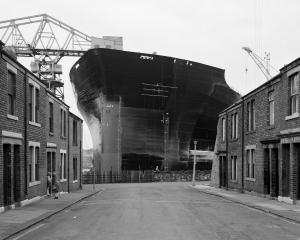
The Last Ships
Mike Quille reviews an exhibition of photographs of the shipbuilding industry on Tyneside.
In honour of the shipyard workers of Tyneside, Chris Killip recently gave a set of over 30 stunning, monochrome images to the Laing Gallery in Newcastle upon Tyne.
The Last Ships exhibition of photographs, taken by Killip over just three years, captures the awe-inspiring scale and beauty of the shipbuilding industry on Tyneside in the nineteen seventies. It documents the resilience but also the desolation of working-class communities, destroyed along with the industry by capitalist economic forces and government policy.

End of Shift
The large exhibition prints, with their striking, powerful images, dominate the walls of the gallery. The massive, sleek black hulls of tankers like the Tyne Pride, the biggest and also one of the last ships to be built on the Tyne, loom over the regular terraced streets where their builders lived. Children stand in doorways, dwarfed visually and protected economically by the vast bulk of newly-built ships. The confident, energetic geometry of angular industrial cranes seem to balance and guarantee the everyday, regular domesticity of workers’ houses. Those workers stream out of the shipyards, and their children play in the streets.
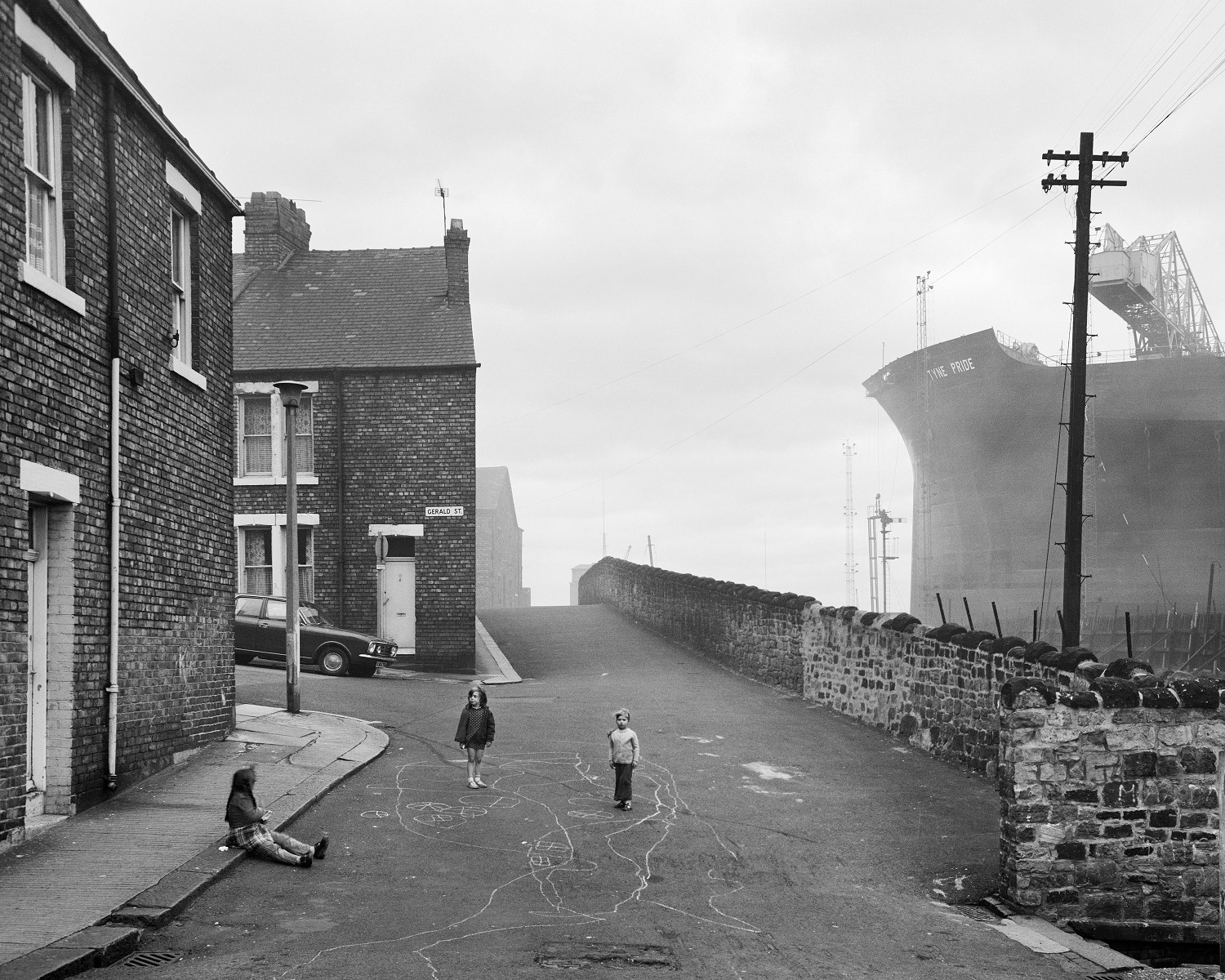
Wallsend Housing Looking East, 1975
Then suddenly, the industry and the community are destroyed. In the above photograph, Wallsend Housing Looking East (1975), Tyne Pride towers over a group of young girls playing at the end of Gerald Street. The photograph below, taken just two years later, Demolished Housing, Wallsend (1977) shows the same street demolished. There are no large ships being built on the Tyne, no children playing in the streets – and no workers streaming out of shipyard gates. A few walls remain standing forlornly amidst the rubble, with spray-painted graffiti on them reading ‘DON’T VOTE. PREPARE FOR REVOLUTION’
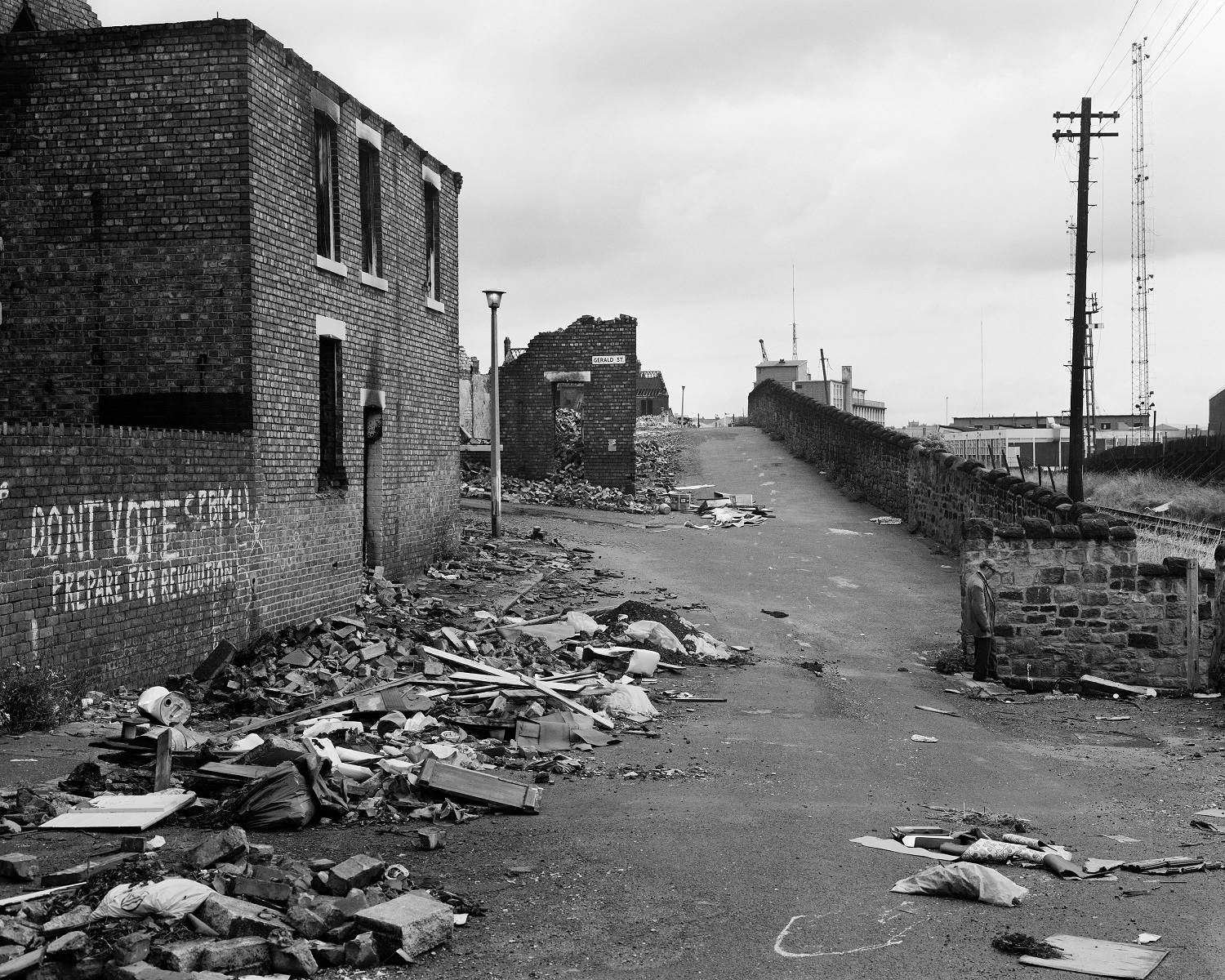
Demolished Housing, Wallsend (1977)
The exhibition is a fitting and just memorial to the lives, energy and strength of Tyneside workers – but it is also much more than that. Killip’s photographs document the productive force of capitalism, the monumental achievements of heavy industry and the close-knit proletarian communities created alongside it. And he also caught the bleak desolation resulting from de-industrialisation, from the sudden, brutal withdrawal of capital, and the historic – and ongoing – economic and social murder visited on Tyneside working-class communities by the rich and the powerful.
The exhibition thus sums up, in a particularly graphic and visually arresting way, a process which has affected most of the British population in one way or another for the last 50 years. It helps explain why so many people voted against the out-of-touch ruling elites of Westminster and Brussels, causing their current political chaos. Is it any wonder that our trust in them disappeared along with the industry, the jobs and the communities they destroyed?
Perhaps, then, we should vote AND prepare for revolution?
All photographs are © Chris Killip. The Last Ships is on at the Laing Gallery, Newcastle, until May 2020. It is free of charge.
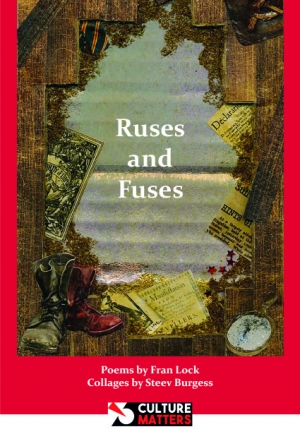
Ruses and Fuses
£8 (plus £1.50 p. and p.) ISBN 978-1-912710-09-6

One of These Dead Places
£8 (plus £3.00 p. and p.) ISBN 978-1-912710-07-2
One of These Dead Places is a collection of poems and images by Jane Burn.
One of the voices rarely heard in modern poetry is that of working-class women, in terms of both the impact of major historical events on their identity, health and happiness, as well as their day-to-day experiences of work, men and motherhood.
In this remarkable, powerful collection, Jane Burn has told her story and more, in a series of poems which are both personal and political. She has also illustrated the poems with a beautifully imaginative series of illustrations, which add depth and detail to the collection.
This is a vital collection for our time. Are things worse than the 80s? Have a read, then decide — you won’t be disappointed. As one of the titles says: these poems are ‘Sentences to Survive In’.

Invisible Britain: Portraits of Hope and Resilience
Mike Quille reviews Invisible Britain: Portraits of Hope and Resilience, and interviews the editor, Paul Sng.
Paul Sng’s films – Sleaford Mods, and Dispossession: The Great Housing Swindle – have explored the lives of working-class people who have been ignored, marginalised or demonised by mainstream media, and who are protesting and challenging the status quo in some way.
In this new book of documentary photographs, the portraits and accompanying text tell the untold, invisible stories of people who have been targeted by austerity economics, left behind by cuts to public services and excluded from mainstream media narratives.
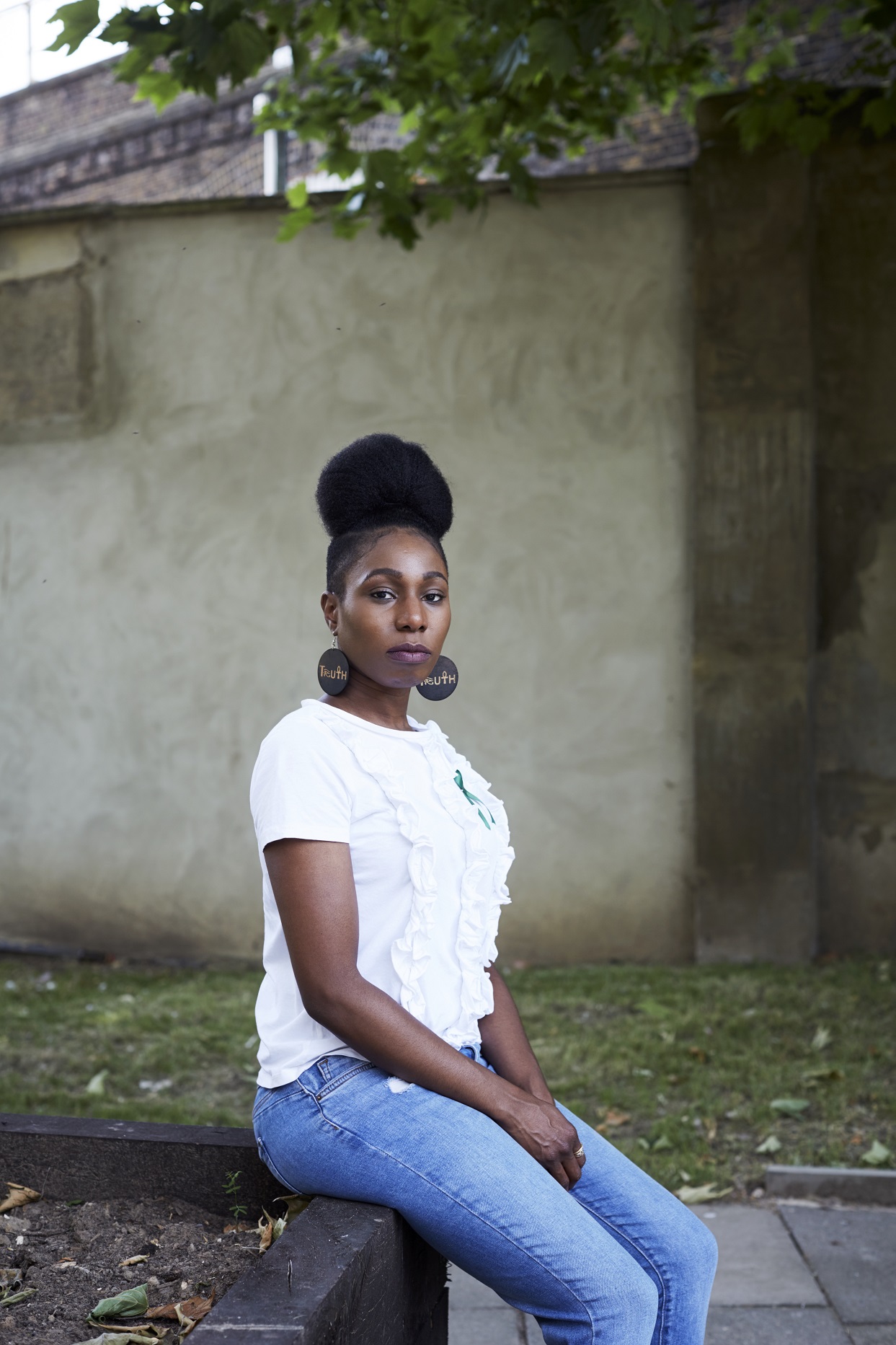
Corinne, by Jenny Lewis
The subjects look out at us in a dignified, equal way. They’re not case studies of despair to grit up a superficial TV drama, nor are they illustrations of some story about benefit scroungers. They are sensitive, revealing and empathic portraits – some inspiring, some heartbreaking – of ordinary people with stories to tell us.

Carl, by J. S. Mottram
Their stories are about their setbacks and suffering, and the various ways they persist in fighting back. Not just through political campaigning, but through voluntary caring work with prostitutes, disabled people, ex-offenders, drug users, and other poor, oppressed and exploited groups in modern capitalist society.
These people have all experienced suffering, exploitation and discrimination, against themselves and those they care about. But their determination, resilience and sense of solidarity shine through both their portraits and their stories. It is striking how much their experiences and values have made them politically aware, quite conscious of the punishment handed out to them by a rigged economic and political system.

Karen, by Jon Tonks
The value, beauty and power of this book lies in its creation of an alternative narrative that challenges all the stigmas and stereotypes that have been generated by the de-industrialisation, discrimination and class conflict of the last few decades of neoliberal capitalism. It is a fine example of the art of photography being used not to fool us with glossy photoshopped adverts of skinny models and shiny cars, but to tell the plain truth of people’s lives these days, and to stimulate our compassion, empathy and desire for radical change.
Ken Loach has said this about the book:
This book illustrates a truth we cannot ignore. Class conflict is at the heart of our society, the inevitable consequence of this economic system. This should be the first principle of our politics. Paul Sng also shows another eternal truth: in the end, people always fight back. Our task is to ensure that their resistance is not in vain.
It is indeed a vivid and truthful account of contemporary class conflict and struggle. But as well as its value as a document, it is also itself part of the cultural struggle – a protest and an inspiration to us all to join and help achieve a better life for the poor, the marginalised and the oppressed – and ourselves.
Invisible Britain: Portraits of Hope and Resilience is published by Policy Press on 1 November. Editor Paul Sng will be touring the book with a series of Q&As and screenings of the film (reviewed here) that helped inspire the book, Sleaford Mods – Invisible Britain, from 1-10 November. Dates and details via www.invisiblebritain.com
The Interview
Q. Can you tell us about your films -- Sleaford Mods: Invisible Britain and Dispossession: The Great Social Housing Swindle?
I fell into filmmaking at the age of 38. Until then I'd worked in a series of office jobs, and before that in bars and shops. I was inspired to make my first documentary after interviewing the band Sleaford Mods in October 2014. They mentioned that they were going to be doing a tour of small venues around the UK in places where a lot of bands don't usually go, some of which were in deindustrialised areas like Barnsley and Stockton-on-Tees, and inner cities that had suffered heavily from government cuts to public services.
It was one of those lightbulb moments. I thought, 'That would make a great documentary'. The idea was developed to be part band doc, part state of the nation film. In each place we visited, we met with people in the local community to ask them how austerity and other unpopular government policies had affected them. The film was shot in the run-up to the 2015 General Election and came out in cinemas in October 2015. 11 months from concept to theatrical release, self-distributed. It's very raw, and perhaps too polemical, but it got noticed and gave me a new career as a filmmaker.
I made my second documentary, Dispossession: The Great Social Housing Swindle, in 2016/17. I made it to examine the neglect and mismanagement of social housing over the past few decades, and how this had affected residents in various areas and council estates in London, Nottingham, and Glasgow.
It came out on 8 June 2017, the day of the last General Election. Five days later, the Grenfell Tower fire happened, which made the film even more relevant. We ran a campaign in tandem with a nationwide tour of Q&A screenings to try and raise awareness about the issues, which was well received.

Nadine, by Nicola Muirhead
Q. What have been your main political and artistic influences?
I've not really thought about political influences before. If I'm influenced by politics it comes through in the issues my work has focused on: austerity, deindustrialisation, housing. Grassroots campaigns inspire me more than politicians, people like Focus E15 and The United Voice of the World union. Artistically, as a documentary maker, my work is influenced by Patrick Keiller, Michael Grigsby and Julien Temple.
Q. What was the background to your move to documentary photography, and this book?
I was in touch with Alison Shaw from Policy Press via Twitter and she mentioned that she'd be interested if I ever had an idea for a book, so I pitched the concept behind Invisible Britain, which is essentially a book of stories and portraits from people who we don't often hear from directly in the arts and media. I then met Laura Dicken, who curated and project managed the book, and we set about finding photographers and people who were up for sharing their stories. I didn't take any photos for the book, as I'm not at that standard yet.
The ethos behind the book was to amplify unheard voices and provide a means for people to speak in their own words about a specific issue or something that had impacted on their life. Direct testimony, with only minimal editing for length. Everyone got to approve the text before it was published. I enjoyed the challenge of working with the photographers – to capture someone's character or an element of their story or personality in a single image shows incredible artistry.

Q. The book seems to be a good example itself of cultural democracy. Many of the photographers are relative newcomers; the focus is on ordinary working-class subjects and their lives; there is a clear egalitarian ethos in the portraits; and the images and text together represent a clear protest against capitalist economics and a longing for a fairer society. What are your views on class, politics and culture generally, particularly in the visual arts?
I think the arts has become too middle-class, and too nepotistic. I see so many examples of people who have very little ability, but very good connections. There's not enough inclusion, and that's across both social class and ethnic background. A lot of organisations have diversity quotas, but I think there's a danger that it becomes a box-ticking exercise.
The book is intended to be the first step towards setting up an Invisible Britain platform that will work with underrepresented individuals and communities to amplify their voices and help enable them to tell their stories in the arts and media. We would also run creative workshops in various areas of filmmaking and a training and mentorship scheme, as well as offering paid work placements on film and television productions. It's in very early development, but I'm hopeful we can do something to make the arts and media more inclusive of people whose voices aren't heard often enough.

Sé, by Cian Oba-Smith
Q. What would be your advice to an incoming Labour government on its priorities to address the issues raised by this book and your work generally? What would a socialist culture policy look like?
I think the priority for any new government should be much greater investment in areas of the UK that don't have any facilities for the arts. More funding for libraries should also be a priority. Labour councils in London are closing libraries by the dozen, which is terrible. More funding for the BFI to build more regional hubs in rural and remote areas. State funding for arts and culture has shrunk over the past decade, and entry to these industries is becoming more and more off limits to working class people. I'd like to see more paid scholarships for exceptional students from disadvantaged backgrounds of all ages to study creative arts courses. There also needs to be greater scrutiny of how and where the funding is spent, to prevent nepotism.

Culture for the many, not the few: notes towards a socialist culture policy
Chris Guiton and Mike Quille present an analysis of what culture means, and what a democratic and socialist approach to culture policy might look like.
Introduction
The mission of Culture Matters Co-Operative Ltd is to promote cultural democracy, which we understand to be a more democratic and socialist approach to all cultural activities (including the arts). These notes set out our contribution to the current debates around cultural democracy. They set out our thoughts on
- What culture means and why it is so important
- The links between cultural activities and politics, and current examples of the way cultural activities function in class-divided societies like our own
- The general principles of a democratic and socialist approach to all cultural activities
- Details and illustrative examples of specific measures which might form part of a programme for an incoming Labour government.
What culture means and why it is important
What is culture? ‘Culture is ordinary: that is where we must start’ said Raymond Williams. This means that culture includes not just the arts, but much, much more. It includes all those learned human activities which give life purpose, meaning and value, and which human beings engage in for enjoyment, entertainment and enlightenment.
So as well as the arts, culture includes sport, religion, eating and drinking, fashion and clothing, education, the media and many other popular activities.
What does culture mean to us? Fundamentally, cultural activities are social, unifying and egalitarian. They assert our common humanity and solidarity against divisions of class, gender, race and other social divisions caused by capitalism. And cultural activities, especially art, can directly inspire and support radical change in the real world.
Taking part in cultural activities, as consumers and as producers, is not some optional extra for us. It is absolutely essential to our development as humans. It sustains our health, well-being and happiness, including our freedom from oppressive political systems and exploitative economic arrangements.
Culture, politics and class
Class-based divisions in society, based on unequal property ownership, constrain or prevent our enjoyment of culture. Cultural activities may be fundamentally liberating and social activities, but in societies divided by class they are limited, appropriated and privatised by ruling elites.
Throughout history, tiny minorities of dominant social classes have tried – and often succeeded – in turning culture into circuses, to go with the breadcrumbs thrown from the tables of the rich and powerful. In these societies, cultural activities become inaccessible, costly, irrelevant, and even an instrument of oppression. It tends to be owned, organised and delivered in undemocratic ways. It legitimises, conceals or ignores oppression and exploitation. And it is often used to promote diversionary and reactionary political messages and values.
So struggles develop against these tendencies to privatise and undermine culture, and to develop and sustain a cultural commons for the many, not the few. We, the many, face a cultural struggle against the co-option, misuse and appropriation of cultural activities. This struggle to regain enjoyable, meaningful and accessible cultural activities is like our economic and political struggles for fairer wages, for ownership and control of essential social goods and services like the railways, the utility companies and the National Health Service.
Just as commercial markets and the profit motive have shown themselves unable to provide adequate public services in areas such as health, energy and transport, so they are also unable to provide accessible culture. The aggressive inroads of neoliberal capitalism, bringing profit-making motives into cultural production, delivery and consumption, and privately owned, corporate influence and control over culture, are major challenges for a socialist cultural policy.
Current Cultural Issues
It is well understood on the Left why we need to win state power and implement political and economic policies to tackle austerity, the assault on our public services, growing poverty and inequality and the lack of political and economic democracy in Britain. What is less well understood is why and how we need to develop cultural policies, which are often perceived as being of secondary importance to political and economic issues.
Here are some examples of the issues we face, which show the need for an inclusive culture policy which can implement cultural democracy:
- in sport, we face high ticket prices for football games which exclude families on tight budgets from attending together. There is the growth of corporate boxes at events, and undemocratic ownership and control of clubs and the way that sport is organised. There is too much funding for elite sport, and not enough at grassroots level. There are the spoiling and corrupting pressures of drugs and cheating in many sports, which inevitably follow from stressing the capitalist values of competitive individualism.
- in the media, we face the private ownership of the means of human communication by gigantic media monopolies like Google, and by companies like Facebook, which appropriate information about us in order to practice surveillance and influence our commercial and political choices. We face privately owned media companies like Sky, Netflix, Disney and Fox, dedicated to making profits rather than meeting human need. And we face state-owned media like the BBC, designed to support and legitimise the economic and political status quo, and which are institutionally biased against radical politicians and newspapers.
- in our social cultures of eating and drinking, we face the terrible effects of profit-seeking capitalist corporations, loading our food and drink with sugar, salt and fats, and causing immense and increasing mental and physical health problems.
-‘There is a poet, author, singer, pianist, actor, playwright, artist in every single person’ said Jeremy Corbyn, but for working class people wishing to have an arts career, it is getting harder to become a musician or actor or writer without rich relatives to support you. Cuts and curriculum changes in education mean our children are being deprived of the chance to learn how to appreciate and participate in artistic, sporting and other cultural educational activities, at both primary and secondary school stages.
- we also face inaccessibility, obscurity, and vapid spectacle, and the fact that state funding is so unequal. Money that comes from our taxes and our Lottery tickets is overwhelmingly focused on cultural provision in the London area, which benefits mainly the already well off, and tourists.
- the massive expansion of the ‘creative industries’ and of cultural activities generally in the last few years means many more people are working in jobs linked to culture. Also, virtually everyone in the labour movement enjoys some form of cultural activity, as a consumer if not as a creator or performer. Creativity is seen as a major factor in the future economy, and a significant component of many kinds of work, both in the traditional cultural sectors and the wider ‘knowledge economy’. But the growth of the creative industries has failed to deliver on its meritocratic promise. Far from offering non-alienated labour, the chance for creative fulfilment, and post-industrial economic regeneration, young people entering the labour market today are being forced to accept poor pay and conditions, chronic job insecurity, and a lack of hard-won basic rights such as sick pay, maternity pay, and pensions. Cultural and creative labour markets are increasingly informal and closed to ‘outsiders’, operating outside equal opportunities and equality legislation and not reflecting the social and demographic make-up of contemporary society.
- the downgrading and exclusion of arts subjects from the educational curriculum of schools, combined with the marketisation of higher education away from the arts and humanities and the gutting of further and adult education, all combine to significantly reduce the opportunities for cultural and creative fulfilment of young people, and have a disproportionate effect on already marginalised groups. The opportunity for the best possible cultural and creative education, as consumers and as producers, should be available for all children, not just those of the wealthy.
- the Government’s politically-driven austerity policies, which have led to huge cuts in cultural facilities, eg libraries, community centres, youth facilities and sports facilities. These cuts are set to continue for years to come; and have been deliberately targeted at the least well-off, geographically and demographically.
- the possibilities of a vast expansion in leisure time in the next 10, 20 and 30 years, as labour-saving technology generates even more unemployment, under-employment and spare time. Again, this will impact more on the working class generally, and on less skilled workers, younger people trying to build careers, and people who are already socially excluded and discriminated against on the grounds of gender, ethnic origin, disability etc. Engagement in fulfilling cultural activities is set to become more and more important in most people's lives.
General principles for a culture policy
In general, a culture policy to implement cultural democracy would need to recognise:
- that culture is fundamental, not marginal. The creative activity embodied in culture is a form of social production, with humanity’s happiness and well-being as its end product. Spectatorship and engagement in cultural production and consumption, widely defined, are essential to human fulfilment and well-being.
- that an inclusive approach to culture is essential if we genuinely want to transform the world for the benefit of working people. Culture policy must cover cultural activities which matter to working people, and which can attract the support of the labour movement, so that culture is seen as part of the social wage for everyone. This means breaking down long-established hierarchies between different kinds of cultural activities and practices – which often reflect class distinctions – and reaffirming the legitimacy of cultural institutions and public funding based upon participatory, democratic and egalitarian principles.
- that we must challenge the narrow, centrally-dictated instrumentalism which has become so central to cultural policy and administration over the last thirty years, accompanied by oppressive monitoring and evaluation requirements, without maintaining an idealist, elitist position eg by focusing solely on the arts and excluding popular cultural activities. A genuinely socialist approach should be based on the understanding that culture, including art, belong to everyone, as creators, performers, and consumers.
- that we need to develop democratic, inclusive and bottom-up cultural policies in which communities of practitioners and audiences are empowered to direct culture towards ends that they define, whether that be entertainment, personal fulfilment, self-expression or as a contribution to the struggle for a better world, and avoiding value judgements on how and why people engage in culture. These might learn from and build on existing examples of successful 'DIY culture' in music, art, poetry and other fields, and large, public examples of working class culture such as the Durham Miners’ Gala.
- that we need to learn, through democratic, grassroots policy-making, how to develop policies and processes which can be used to encourage, enable and facilitate people to participate in cultural activities. These policy-making processes need to tackle concrete issues of accessibility, in terms of cost, geography and content; ownership and control of the institutions that fund, organise, deliver and regulate cultural activities; recognition of the fundamental need to embrace diversity of gender, race, nationality, sexuality, class, religion etc in the production and consumption of culture; and consideration of how to decolonise culture, and challenge the dualism of cultural ‘consumers’ and ‘producers’.
Specific Policy Proposals
The following examples of specific policy proposals reflect and build on many of the good ideas that have already been proposed as a contribution to the culture policy of an incoming Labour government. It is not an exhaustive list, further work is needed to clarify and develop the details, but we offer them in a constructive spirit to stimulate discussion:
- Require government policy makers (national, regional and local) to test proposed policy objectives against an over-arching objective of the promotion of a cultural democracy which works for the common good. Review whether relevant institutions and processes are fit for that purpose, and closely monitor implementation of such a radical policy in order to ensure that it is not captured by sectional interests.
- Dismantle the barriers that constrain or prevent ordinary people from accessing culture, particularly that which is publicly funded, based on cost, geography, class and social exclusion. Ensure that people generally have an equal opportunity to join in and enjoy all the arts and cultural activities.
- End the corporate capture of the Arts Council and other publicly funded arts bodies, exemplified by the recent appointment of Elisabeth Murdoch to the National Council of Arts Council England. Ensure that cultural funding is distributed equally, regionally and demographically, with regional, local and community participation to ensure that cultural spending empowers the communities that elect those representatives. Champion investment in people over large-scale vanity projects which benefit a narrow elite.
- End the distorting impact of corporate sponsorship and private philanthropy on the freedom and independence of cultural institutions.
- Ensure that leaders of cultural institutions – not only theatres, art galleries, concert halls and poetry publishers, but sports clubs, churches, and broadcasting and media corporations – seek to engage with all sections of the community, particularly the least well off and the least powerful.
- Explore ways to recover working class history and culture at a national, regional and community level, and restore the democratic and humanist cultural traditions that have been eroded by neoliberalism. This might build on the examples of local ‘people’s museums’ which have been set up in parts of the country, using community facilities and contributions by local people to build a picture of the locality.
- Recognise and support the important community role played by small music, visual and performing arts venues, many of which are facing closure as a result of commercial pressures or removal of grants or local funding. These play a vital role in developing creative ability and should be supported via business rates relief, direct subsidy and protection from commercial or residential development.
- Build on our rich history of community arts and sports by extending support, via regional culture councils and other relevant organisations and local authorities, to make space and resources available, so that creative and recreational activity is both available and accessible in urban and rural locations.
- Ensure that the cultural sector sets the standard in terms of workers’ rights, guaranteeing at least the UK Real Living Wage for all its employees, including artists and interns, management, technicians, cleaners and security staff. Introduce trades union representation into the governance arrangements of every public cultural institution.
- Rediscover the value of employer-supported workplace activities to facilitate sports and other forms of cultural participation.
- Provide proper funding for museums, galleries and libraries, to ensure that they play a much more active part in the lives of their communities, providing a place for creative activity and social connection and ensuring accountability to their publics. Museums and galleries should maintain free entry as a general principle, and offer genuine concessionary rates and free entry to low income groups to special events and exhibitions.
- Investigate and remove the barriers that exist in all cultural sectors towards equality of access to cultural and creative work by tackling the educational, financial, employment, career progression and management obstacles that prevent these sectors from reflecting the diversity of our population, particularly at leadership levels.
- Tackle the absence of significant working class representation in all cultural institutions (including the arts, sports, religion, the media, science and technology etc.) in terms of its content, audiences and practitioners.
- Amend the Equality Act to add consideration of class, social exclusion, poverty and inequality to the current policy framework, in parallel with the standard definitions of diversity, with their role factored in to all considerations of access, funding, participation etc.
- Empower and encourage local authorities to facilitate re-municipalisation at a local level, supporting social ownership for all cultural activities through co-operative and other forms of accountable, democratic self-organisation, where wealth is embedded and shared among communities rather than extracted for private gain.
- End the accelerating process of gentrification taking place in many of our cities, which first exploits and then drives out artists from local neighbourhoods. Encourage the recognition of artists as people who contribute to and enrich local communities. Consider options to set up a system of grants to provide living and material costs for artists working in community-based settings.
- Ensure art and culture are integral to the education system, free at the point of use, embedding arts education into the national curriculum so that all children in Britain, from primary school up, have the opportunity to access the best cultural and creative education, recognising the value it plays in the development of social, cognitive, emotional and physical skills and promoting lifelong arts learning.
- End the destructive audit and accountability culture, excessive testing and associated narrowing of the curriculum in our schools. Replace it with an approach to education which is holistic, enables children to live their lives to the full, and which addresses mental and physical health and wellbeing; encouraging students to think critically, questioning everything, nurturing enthusiasm for learning and intellectual curiosity.
- Reform and democratise the BBC to enable it to genuinely fulfil its public service broadcasting obligations and make a positive contribution to society, fully representative of its diverse audiences. Give adequate space and time to publicising and encouraging grassroots, DIY culture, and film and TV productions which offer a progressive or socialist vision of a fairer society
- Tackle the corporate capture of the web by monopolistic advertising platforms such as Google and Facebook via the introduction of effective regulation and taxation. Consider options for forms of social ownership of privately owned social media platforms. Facilitate the creation of decentralized social media networks, owned and controlled by the people.
- Introduce a statutory duty of care for the larger social media services, covering the key harms seen on social media platforms (harassment, misuse of personal data, hate crime, intimidation etc), backed by effective enforcement.
Sport and Leisure
- Challenge the commodification of football and other sports by using regulation and taxation to restrict corporate exploitation of clubs, players and spectators, and facilitate a return to the social and community origins of our national sports.
- As part of this new approach, tackle the chronic under-investment in football by enforcing a five per cent levy on Premier League broadcasting rights to be ploughed back into the grassroots game to improve pitches, facilities and training opportunities. Explore options to extend this policy to other sports such as cricket and rugby, which are similarly disfigured by corporate funding.
- Facilitate a shift of public spending on recreation and sport from high profile, elite sports to a greater range of community sports, encouraging a more inclusive and egalitarian ethos in sports institutions and activities, with full community participation in their governance, design and delivery.
- Improve the democratic accountability of sports clubs by giving supporters a greater say in how their clubs are run, at board level, including decisions regarding ownership changes and property sales.
- Require sports authorities to make significant improvements on provisions for fans with disabilities.
- Make the protection of public parks, playgrounds and leisure centres by local authorities and other bodies a legal requirement, prohibit privatisation and outsourcing, and provide proper funding to ensure they are properly maintained and remain free to use.
Conclusion
The arts and other cultural activities are often co-opted to reflect and serve the needs of the dominant class, in a class-divided society such as ours. At the same time, though, they can also provide the space to resist the status quo, to overcome alienation and oppression, and bring enjoyment and meaning into our lives. They can help people envision better, fairer ways of organising our society, as well as promoting our physical, mental and spiritual well-being.
These notes are intended to stimulate debate about the shape and content of a radical and comprehensive culture policy that a future Labour Government might be encouraged to adopt. Clearly, they are not the final word on the subject. Much work needs to be done to test ideas, develop detail and fill gaps. But, hopefully, they provide food for thought and offer a platform for further discussion. Readers are invited to submit general pieces (critical or creative) to our website, to help further the debate. They may also wish to consider joining the Movement for Cultural Democracy, which is a new campaign to drive a radical and transformative cultural programme in the UK.
Now is the time to seize the opportunity to create a comprehensive package of culture polices for the many, not the few.
With thanks to Theresa Easton, Sophie Hope, Jack Newsinger, John Storey and many others, for their valuable comments and contributions to this article.

arise!
£5 plus £2 p. and p.
ISBN 978-1-912710-03-4
arise! is a new long poem by Paul Summers, which is both a celebration of the past, and an inspiration for the future. The pamphlet was commissioned by Culture Matters for the Durham Miners' Gala this year, and it is sponsored by the Durham Miners' Association.
The poem celebrates the rich heritage and culture of mining communities, which is expressed so vibrantly and colourfully in the marches, the banners, the music and the speeches at the Durham Miners’ Gala. It invokes the collective and co-operative spirit of past generations of men and women who worked and struggled so hard to survive, to build their union, and to organise politically to fight for a better world.
arise! also celebrates the new, resurgent spirit in the Labour Party, led by Jeremy Corbyn, and the renewal of support for socialist solutions to the country’s growing economic and social problems.
It's wonderful to see the proud history of the Durham Miners' Gala represented in this powerful poem. Paul Summers has managed to capture the spirit of the Miners' Gala and its central place in our movement's mission to achieve 'victory for the many, and not the few'. – Jeremy Corbyn, leader of the Labour Party.
A powerful, rhythmic and inspiring poem – Alan Cummings, Secretary, Durham Miners' Association.
‘arise!’is a full-throated song of defiant hope, seeing in the history of the coal industry much to mourn, yet much to celebrate. – Sean O’Brien, Professor of Creative Writing, Newcastle University
10% of the proceeds of sales of this book will go to the DMA Redhills Appeal, to help turn Redhills into a cultural hub for the area.

Their walls are our stones
What would a radical, socialist culture policy look like?
Last September I reported on The World Transformed festival, organised by Momentum alongside the Labour Party conference in Brighton. It included several workshops on culture, looking at what the elements of a radical culture policy might be, building on the commitments in the 2017 Labour Manifesto.
That manifesto was a marked improvement on previous manifestos, and clearly reflected the personal vision of Jeremy Corbyn and his team. He was the only candidate in 2015 to support the role of the arts in nourishing everyday creativity, and its potential for political dissent.
The manifesto also backed policies to improve working class access to culture, both as workers in creative industries – musicians, actors, writers etc. – and as spectators and consumers of culture.
The open, participatory nature of politics which the Brighton workshops exemplified has now become the Movement for Cultural Democracy, with a new website, http://colouringinculture.org/cultural-democracy-home, and a series of planned regional events to consult on what a radical culture manifesto should look like.
Culture Matters supports this movement. We believe that culture is more than just the arts. Culture is ordinary and culture is everything, as Raymond Williams said. It includes all the cultural activities that are essential for our enjoyment, entertainment, enlightenment and exercise as fulfilled human beings.
Cultural democracy is about reclaiming and developing our artistic, intellectual, physical and spiritual commons. It’s about struggling in a democratic and socialist way to overcome the profit-driven pressures which make all kinds of cultural activities expensive, inaccessible or irrelevant. Or even worse, when they facilitate surveillance and manipulation – as in the current Facebook scandal – instead of nurturing human development and liberation.
As Len McCluskey said here a few months ago,
Unite, Britain’s biggest trade union, believes that our members, and working people generally, have an equal right to join in and enjoy all the arts and cultural activities. We believe we should be able to afford them, be near to them, and be able to enjoy them.
Most of all, we believe artists and leaders of cultural institutions – not only theatres, art galleries, concert halls and poetry publishers, but sports clubs, churches, and broadcasting and media corporations – should seek to engage with all sections of the community, particularly the least well off.
These radical calls for the democratisation and socialisation of culture should be at the heart of a new culture policy.
Our profit-driven capitalist economy seeks to destroy or co-opt the potential of the arts to express dissent and imagine alternatives. And it shrinks from the spectre of everyday, emerging communism, which is generated naturally when people get together in generous solidarity to enjoy the arts, sport, science, eating and drinking, and so much else. It throws up barriers between social classes, genders, ethnic groups, building divisive walls based on the private ownership of property.
We need to break down those walls. We need to reclaim and renew our artistic, physical, intellectual and spiritual commons. We need to democratise and socialise our cultural institutions – the art gallery, the football club, the newspaper, the church and the laboratory, as well as the economic and political ones – the factory, the corporation, the council, Whitehall and Westminster.
Their walls are our stones.
